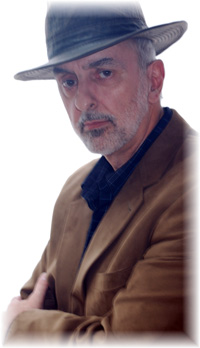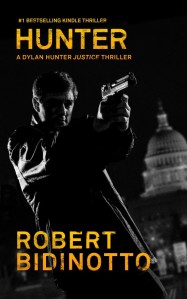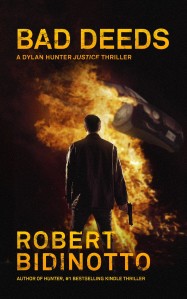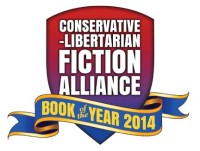I know, I know: We’re in a recession. You’re careful about spending. Which is why some readers like you have asked me if they can sample a few pages of my new thriller, HUNTER, before deciding whether to purchase it.
Well, I’m happy to oblige. Today I gave permission to a writers’ website, “Writing on the Rocks,” to publish the following excerpt from early in the novel. No, it’s not from one of the many action scenes; instead, it’s a sequence that motivates the later action scenes.
I hope you enjoy it.
~*~
ARLINGTON, VIRGINIA
Monday, September 1, 6:45 p.m.
They stood in the hallway of the funeral home. Susanne Copeland, clutching a tissue, stared at the open door of the parlor just ahead of them, on the left. Her eyes were red-rimmed and swollen; her dark-red, shoulder-length hair bordered a pretty face now lined with pain and fatigue, a face that seemed to have aged ten years in the past three days.
She breathed deeply. “Okay. I guess it’s time.”
Annie took her arm gently and they began to walk slowly toward the room, followed closely by about a dozen of Susie and Arthur Copeland’s closest family members.
The funeral director who had greeted them at the building entrance had walked ahead, and now stood to one side of the parlor door. On the opposite side of the entrance a small, marble-topped table supported a spray of white roses, the visitors’ register, and a golden pen. The director smiled sadly as they approached, his hands clasped before him like a maitre d’.
“Mrs. Copeland,” he said, placing a consoling hand on her shoulder, “please take all the private time you need, and let me know if you require anything, anything at all.”
She blinked and swallowed. “Thank you, Mr. Reynolds.”
He moved to greet the relatives following them. She glanced at Annie, then at the door yawning open before her, as if it were the entrance to hell. Annie gave her arm a supportive squeeze. Susie took another deep breath, let it out, and they entered.
Soft string music was playing over the intercom—some banal, bittersweet religious hymn. She felt Susie’s arm go rigid at the first sight of the casket. Illuminated by hidden lights, it rested in a recessed alcove to their right. It was a gleaming bronze thing lying on a bier draped in cascades of rich white fabric, surrounded by what seemed to be a solid wall of floral wreaths and displays. The sickly sweet scent of hundreds of flowers was almost overpowering.
Arthur Copeland’s face and folded hands were visible against the white satin of the casket’s open lid.
As they neared, Susie’s pace slowed; then her steps became halting, each punctuated by a little gasp. The gasps became sobs. She sank onto the kneeling pad at the side of her husband’s body.
“Oh God. Oh God. Oh Arthur!” she cried out, her voice high and thin. She reached out a trembling hand, touched his sleeve. “Oh Arthur!”
Annie found hot tears running down her own cheeks. She knelt beside her friend, wrapped her arm around her quaking shoulders. Susie turned into her, and they hugged and cried together.
Annie didn’t know how long they remained like that. She became dully aware of the family members around them, sobbing and praying.
Eventually, Susie regained her composure. Annie helped the young widow to her feet and then stepped aside to let her lean in close to her husband’s body.
It was a cliché, she thought, but Arthur looked as if he were merely asleep. The man’s face, so anguished during the past two years, was serene now—unlined, unmarked, bespectacled, just as it had been earlier in his life. She had dreaded seeing his body tonight almost as much as Susie had; but she marveled now that there was no sign of the gunshot wound that he had inflicted to his own skull. Clearly, the funeral director was as skilled at his own reconstructive craft as Dr. Arthur Copeland had been at his. At just forty-four, Arthur had been one the nation’s most renowned plastic surgeons.
“I can’t believe it. I can’t believe it,” Susie said, shaking her head. “Oh, Arthur, why?” She touched his clasped hands, flinched a bit—the shock of the hard coldness, Annie realized—but then let her palm rest on them. She touched his wedding ring with her forefinger. Then she leaned her face over his, and began to talk to him so quietly that Annie could no longer hear what she was saying. As she spoke, she patted his loose blond strands. Smoothed the lapel of his charcoal suit. Ran her palm down his tie.
Annie had to turn away. Each of her friend’s tender gestures felt like the thrust of a knife.
At last, Susie bent and kissed Arthur’s forehead. She straightened and hesitated, swaying slightly.
“Susie dear, would you like to sit down, now?”
Her cheeks were wet, her eyes dazed; she was beyond exhaustion. “Yes. Thanks. And maybe a little water.”
They took seats in a line of chairs positioned not far from the casket. Annie fetched a paper cup of water from a cooler in the corner and found a box of tissues. The rest of the family members joined them, consoling each other quietly as they took their seats. After a while, the director entered, closing the door behind him, and approached.
“Mrs. Copeland, many of your friends and family have already gathered outside. Just let me know when you feel ready to receive them.”
“I’m ready. Ready as I can be.”
He smiled gently. “He obviously was a beloved man. We haven’t had this many visitors here for a very long time.”
He returned to open the door, and people began to file in slowly. They first approached the body to kneel and pray, then turned to the waiting family, most of whom stood to receive them. Annie stood beside Susie, who remained seated. The visitors, some in tears, leaned over to hug her and whisper the painfully trite things that people always struggle to say to those who have lost a loved one. Once past the receiving line, many stayed for a while, taking seats in the rows of padded folding chairs that filled the rest of the parlor.
Annie was not surprised to recognize and greet a number of those filing past her: They were co-workers from Langley. Susie was a long-time European analyst in the Directorate of Intelligence, and Arthur had worked for the Agency on a consulting basis for over a dozen years. She was astonished, though, when the CIA director himself entered, flanked by several top Agency people, including Grant Garrett. Nobody had told her about this. But then again, they wouldn’t announce in advance the itinerary of such a group. She knew the two OS security officers flanking the door; many more would be outside, forming a protective cordon around the building and the armored limos.
The intelligence chiefs paused as a group at the casket for a solemn moment, then made their way to Susie. Each of them hugged her and expressed sadness that Annie knew was heartfelt. When they reached her, they greeted her quietly and by name. Garrett, his face stony, nodded, said a terse hello, and gave her a brief hug before moving on. After they passed through the receiving line, they wandered among the seated guests, exchanging handshakes with some of those whom they recognized and—she had to smile to herself—pointedly ignoring others whose identities it would be unwise to acknowledge….
Her eyes roamed the endless line still wending its way into the parlor. Then rested on a man framed in the doorway.






 Photo (c) by Debbie Scott
Photo (c) by Debbie Scott




